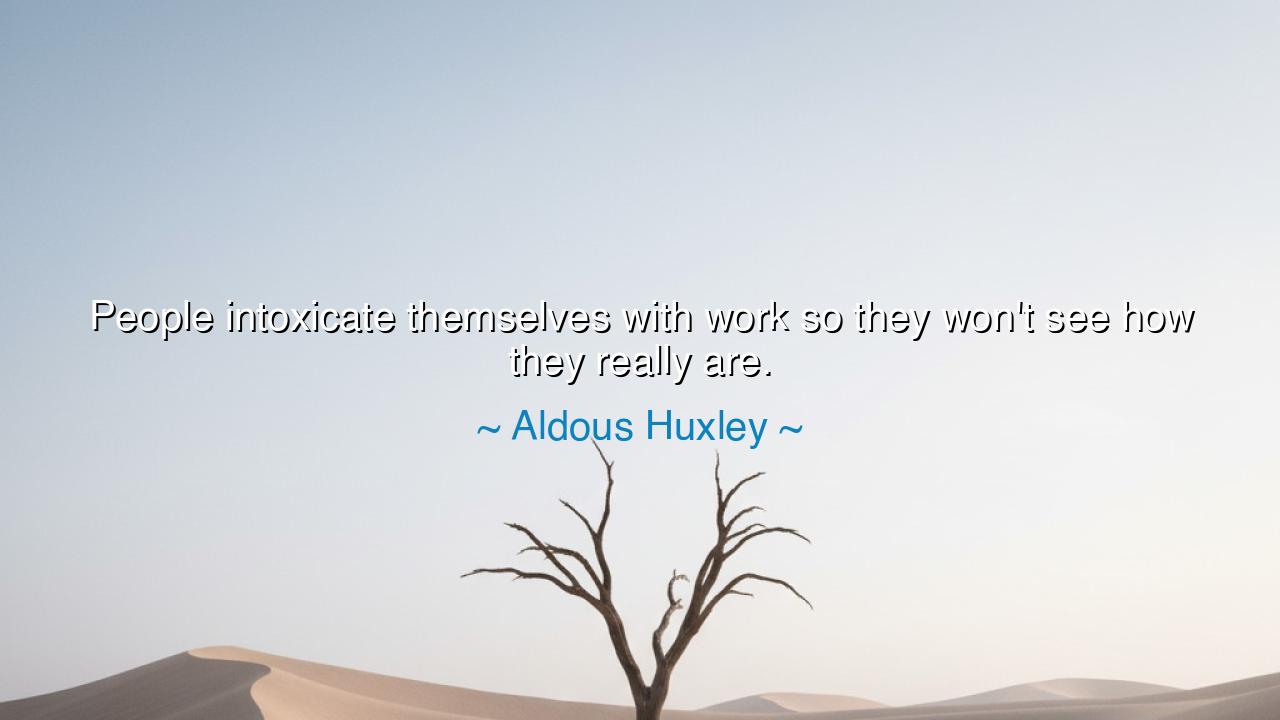
People intoxicate themselves with work so they won't see how






In the corridors of the human spirit, there lies a shadow that many seek to avoid: the reflection of one’s true self. Aldous Huxley speaks to this quiet peril when he declares, “People intoxicate themselves with work so they won’t see how they really are.” These words reveal the subtle seduction of busyness, a cloak that conceals the soul from its own gaze. The ancients taught that self-knowledge is the highest pursuit, yet many flee from it, filling their hours with toil to escape the mirror of introspection.
To intoxicate oneself with work is to seek refuge in constant activity, as if labor could mask the emptiness, fears, or desires within. Huxley observes a universal truth: humans are often terrified to confront the stillness of their own hearts. In the frenzy of action, the mind is distracted, the heart numbed, and the self hidden behind the endless tasks that demand attention. Yet the more one runs from self-examination, the further one drifts from understanding the very essence of being.
The danger of this habit lies in its subtlety. Work, though noble and necessary, becomes a sedative when employed to avoid truth. Huxley’s insight reminds us that how we really are is not always pleasant, for it carries the weight of our regrets, insecurities, and unfulfilled longings. Yet facing this reality is the path to genuine growth and liberation, for only by acknowledging oneself can the soul be healed and strengthened.
The origin of this wisdom is ancient. Philosophers and sages across civilizations — from the meditative hermits of the East to the reflective thinkers of Greece — recognized that the pursuit of distraction is a form of self-deception. They warned that without deliberate contemplation, the heart becomes a stranger to itself, and a life filled with activity alone is a life half-lived. Huxley’s modern observation echoes this timeless teaching, revealing that even in a world of ceaseless labor, the soul’s true hunger remains unchanged.
Thus, let this teaching endure: do not allow the clamor of work to drown the voice within. Pause, reflect, and behold how you really are, for in the honest confrontation with oneself lies wisdom, peace, and the strength to live fully. To labor is noble, but to know oneself is sacred — a truth that stands eternal across the ages.






HHVo Huy Hoang
Huxley’s quote raises an interesting question about our relationship with work. It’s easy to lose sight of who we are when we’re constantly on the go. But do you think this behavior is always negative? Could there be some positive aspects to using work as a distraction, such as helping us focus during tough times or giving us a sense of purpose? Or does this tendency eventually catch up with us, forcing us to confront ourselves when we least expect it?
KNKi Na
I can’t help but agree with Huxley’s statement. Work has become a way of avoiding uncomfortable feelings or truths about ourselves. But is it the work itself that’s the problem, or the way we use it as an emotional crutch? How do we find a way to be honest with ourselves without feeling overwhelmed? It seems like the key is to find time for introspection while still being productive, but is that really possible in such a demanding world?
TTLuong Ngoc Thanh Truc
Huxley’s quote really hits home. There are so many people who use work as an escape—whether it’s from loneliness, anxiety, or past trauma. But in the process, do we lose touch with who we really are? How can we strike a balance between staying productive and ensuring we’re not using work to numb ourselves from deeper, unresolved issues? Is it possible to be both fulfilled in work and emotionally aware?
UGUser Google
I find Aldous Huxley’s perspective both thought-provoking and cautionary. It’s easy to get caught up in work as a means of escaping difficult emotions or realities. But how often do we stop and really assess whether we’re using work as a tool for growth, or merely as a distraction? Could this avoidance of self-awareness eventually lead to regret later in life, when we finally confront what we’ve been hiding from?
NTNgan Thu
This quote by Aldous Huxley really makes me think about the pressures of modern life. With the constant hustle and the culture of being 'busy,' is work just a shield for many? Sometimes, it feels like we’re too scared to face who we are, so we mask it with tasks and deadlines. But does this constant work ethic leave any room for true introspection or personal growth?